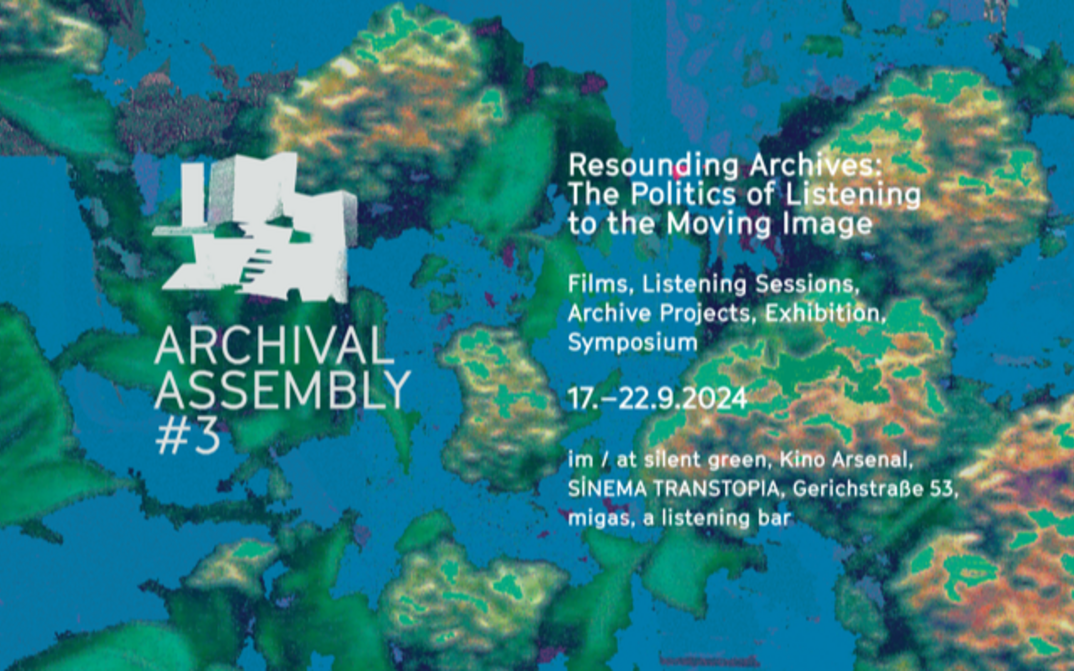Symposium Day One - Resounding Archives: The Politics of Listening to The Moving Image

Wed 18.09.
09:00
Cinema
silent green Kulturquartier
zu dem KalenderFree admission
Wednesday, September 18, 2024
09:00
Arrival at silent green Kuppelhalle
09:30
Welcoming remarks by Vinzenz Hediger and Stefanie Schulte Strathaus
10:00–11:30
Panel 1
Rumors Recorded and Remembered: Oral Histories and the Archives of Gossip
We don’t see most films, we just hear about them. Hearsay and rumors, chatting about and over films, and film stars and film lovers are as much a part of film culture as the deep contemplation of individual films on screen (and through sound systems). Fluid and fleeting, rumors, comments, confessions, and gossip barely leave traces in traditional archives. So how can we record, remember, and revivify them?
Erika Balsom (London) will talk about the silent screening with live commentary of documentary footage shot by Vibeke Løkkeberg during the first international “Frauenfilm-Seminar” of 1973 at Archival Assembly 2023.
Marc Siegel (Mainz/Berlin) will talk about gossip as a productive mode of knowledge circulation.
Moderation: Petra Löffler (Oldenburg/Berlin)
12:00–13:30
Panel 2
Sonic Maps of Migration: Documentary Sound Archives
Mobile sound recorders revolutionized documentary filmmaking in the 1960s, making documentaries a migratory form with an affinity for migratory movements. Increasingly, soundscapes, and sound archives have been reshaping the migratory aesthetics of documentaries.
Petna Ndaliko Katondolo (Goma) will talk about soundscapes and trauma.
Britta Lange (Berlin) will discuss the latency of colonial sound archives.
Moderation: Laliv Melamed (Frankfurt am Main)
Vinzenz Hediger is Professor of Cinema Studies at Goethe University Frankfurt, where he directs the DFG Research Training Program Configurations of Film (www.konfigurationen-des-films.de) and the area studies project CEDITRAA - Cultural Entrepreneurship and Digital Transformation in Africa and Asia (www.ceditraa.net). He is a co-director of GU’s research center ConTrust - Trust and Conflict under Conditions of Uncertainty. His research covers film theory, film and media history, documentary forms, and organizational media and supply studies.
Stefanie Schulte Strathaus is the Artistic Director of Arsenal – Institute for Film and Video Art in Berlin. From 2001-2019, she was a member of the selection committee of the Berlinale Forum, and from 2006-2020 the founding director of the Berlinale section Forum Expanded. She has curated film exhibitions as well as research and exhibition projects such as Living Archive – Archive Work as a Contemporary Artistic and Curatorial Practice (2010-2013) and Archive außer sich (2017-2022). In 2021 she launched the biennial festival Archival Assembly. Her work deals with the intersections of film restoration, exhibition, and distribution, focussing on collaborative and decolonial thinking and practice. Schulte Strathaus serves on the boards of the Harun Farocki Institut and the master’s program Film Culture at the University in Jos/Nigeria. She is co-editor (with Vinzenz Hediger) of Accidental Archivism: Shaping Cinema’s Futures with Remnants of the Past (meson press, 2024).
Erika Balsom is a reader in film and media studies at King’s College London. She is the author of four books, including After Uniqueness: A History of Film and Video Art in Circulation (2017) and TEN SKIES (2021). Her writing has appeared in venues such as Cahiers du cinéma, Frieze, Grey Room,and New Left Review. In 2022-23, she was the co-curator of the exhibition No Master Territories: Feminist Worldmaking and the Moving Image (HKW Berlin/Museum of Modern Art, Warsaw).
Marc Siegel is Professor of Film Studies at the Johannes Gutenberg University in Mainz. His research focuses mainly on questions of queer studies and experimental film. His book A Gossip of Images is forthcoming with Duke University Press. Recent publications include the co-edited volume Serge Daney and Queer Cinephilia (meson press, 2024). He is a member of the Berlin-based art collective CHEAP and the Academy of the Arts of the World in Cologne.
Petra Löffler is a media and cultural studies scholar and has been professor for theory and history of contemporary media at the Carl von Ossietzky University Oldenburg since 2020. She has held professorships at the University of Siegen, Bauhaus University Weimar and Humboldt University of Berlin and was senior fellow at Bauhaus University Weimar and Leuphana University Lüneburg. Her research focuses on media ecology, media art history and practices, and decolonizing methodologies.
Petna Ndaliko Katondolowas born in Goma, DR Congo, and is a filmmaker, educator, and ancestral ecologist. His multi-genre artistic works are acclaimed for their decolonial Afrofuturist style, which engages historical content to address contemporary sociopolitical and cultural issues. In 2000, he co-founded the educational center Yolé!Africa and in 2005, he founded the Ishango Encounter (formerly known as Salaam Kivu International Film Festival). Ndaliko Katondolo teaches and consults regularly for international organizations, addressing social and political inequity among marginalized groups through culture and art.
Britta Lange has been a teacher and researcher since 2011 in the Department of Cultural History and Theory at Humboldt University of Berlin, focusing on the cultural history of the 18th to 21st centuries, cultural technologies, and colonial and post-colonial constellations. In 2007, together with Philip Scheffner, she produced the exhibition The Making of…Ghosts about historical sound recordings by prisoners of war. Her book Gefangene Stimmen was published in German in 2019 and as an English-language eBook translated by Rubaica Jaliwala in 2022.
Laliv Melamed is an associate professor of digital film culture at Goethe University Frankfurt. She specializes in documentary and non-fiction media and her work has involved questions of state violence, governance, and politics of intimacy in the Middle East. Melamed is the author of Sovereign Intimacy: Private Media and the Traces of Colonial Violence (University of California Press, 2023). She is currently working on a book on military optics and aspects of state secrecy entitled Optics of Opacity: The Public Secret and the Cultural Imaginaries of Operativity. In addition, she has worked as a film programmer for Docaviv Film Festival and has curated programs for The Left Wing film club and International Short Film Festival Oberhausen.